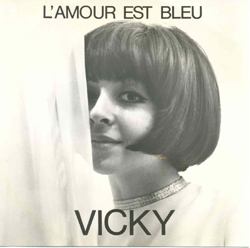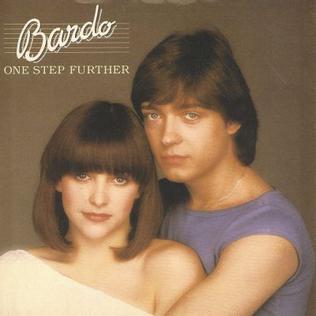
The Eurovision Song Contest 1984 was the 29th edition of the Eurovision Song Contest, held on 5 May 1984 in the Théâtre Municipal in Luxembourg City, Luxembourg. Organised by the European Broadcasting Union (EBU) and host broadcaster Radio Télévision Luxembourg (RTL), the contest was held in Luxembourg following the country's victory at the 1983 contest with the song "Si la vie est cadeau" by Corinne Hermès. The event was presented by Désirée Nosbusch, who, at 19 years old, remains the youngest person to have hosted the contest as of 2024.
The United Kingdom held a national preselection to choose the song that would go to the Eurovision Song Contest 1973.
The United Kingdom held a national preselection to choose the song that would go to the Eurovision Song Contest 1976.
The United Kingdom held a national preselection to choose the song that would go to the Eurovision Song Contest 1977, which was held in Wembley, London following the United Kingdom's victory in the previous year's contest.
The United Kingdom was represented in the Eurovision Song Contest 1984 by Belle and the Devotions with the song "Love Games". It was chosen as the British entry through the A Song for Europe national selection process and placed seventh at Eurovision, receiving 63 points.
Samantha Janus represented United Kingdom in the Eurovision Song Contest 1991 with the Paul Curtis-written song "A Message to Your Heart", which was placed 10th.

Nicola Sharon French is an English singer. She is best known for her 1995 dance cover version of "Total Eclipse of the Heart", which reached the US and UK top 5, and for representing the United Kingdom in the 2000 Eurovision Song Contest in Stockholm.

Eurovision: You Decide is the most recent name of a BBC television programme that was broadcast annually to select the United Kingdom's entry for the Eurovision Song Contest. The show had previously gone under several other names, including Festival of British Popular Songs (1957), Eurovision Song Contest British Final (1959–1960), The Great British Song Contest (1996–1999), Eurovision: Making Your Mind Up (2004–2007), Eurovision: Your Decision (2008), and Eurovision: Your Country Needs You (2009–2010), but was known, for most of its history, as A Song for Europe.

"L'amour est bleu" is a song whose music was composed by André Popp, and whose lyrics were written by Pierre Cour, in 1967. Bryan Blackburn later wrote English-language lyrics for it. First performed in French by Greek singer Vicky Leandros as the Luxembourgish entry in the Eurovision Song Contest 1967, it has since been recorded by many other musicians, most notably French orchestra leader Paul Mauriat, whose familiar instrumental version became the first number-one hit by a French lead artist to top the Billboard Hot 100 in America.

"Bang-A-Boomerang" is a song by ABBA, first released by Svenne & Lotta. The track was first recorded as a demo with English lyrics in September 1974 by the ABBA musicians for their eponymous album ABBA. The song was written by Benny Andersson, Björn Ulvaeus and Stig Anderson and at one point had the working title "Stop and Listen to Your Heart". The lyrics compare the "message of love" with the returning boomerangs which the Aboriginal Australians developed.

"Diggi-Loo Diggi-Ley" is a song recorded by Swedish trio Herreys –brothers Per, Louis, and Richard Herrey–, with music composed by Torgny Söderberg and Swedish lyrics written by Britt Lindeborg. It was produced by Anders Engberg and Torgny Söderberg. It represented Sweden in the Eurovision Song Contest 1984, held in Luxembourg, winning the contest.

"Fly on the Wings of Love" is a song recorded by Danish pop-rock duo Olsen Brothers –Jørgen and Niels Olsen–, with music composed and lyrics written by Jørgen Olsen. It represented Denmark in the Eurovision Song Contest 2000, held in Stockholm, resulting in the country's second win at the contest.

"Tu te reconnaîtras", is a song recorded by French singer Anne-Marie David, with music composed by Claude Morgan and lyrics written by Vline Buggy. It represented Luxembourg in the Eurovision Song Contest 1973 held in Luxembourg, winning the contest.
Belle and the Devotions were a British pop group, ostensibly a group named after the singer Kit Rolfe. Under this name, she released the singles "Where Did Love Go Wrong?" and "Got to Let You Know" in 1983.
Paul Michael Curtis is an English singer, songwriter, record producer from London, who holds the record for the highest number of songs to make the finals of the A Song for Europe contest, the BBC's annual competition to choose the UK's entry to the Eurovision Song Contest, competing with 22 separate songs from 1975 to 1992.

"One Step Further", written by Simon Jefferis, was the United Kingdom's entry at the Eurovision Song Contest 1982, performed by the duo Bardo, comprising Sally Ann Triplett and Stephen Fischer.
"Give a Little Love Back to the World", written and composed by Paul Curtis, was the United Kingdom's entry at the Eurovision Song Contest 1990, performed by Emma. At the age of 15, Emma was the youngest-ever entrant on behalf of the United Kingdom at Eurovision.

"A Message to Your Heart", written and composed by Paul Curtis, was the United Kingdom's entry at the Eurovision Song Contest 1991, performed by singer and actress Samantha Janus. Paul Curtis had also penned the previous year's entry, "Give a Little Love Back to the World".

"Say It Again" was the United Kingdom's entry for the Eurovision Song Contest 1999, written by Paul Varney and performed by girl band Precious. It was produced by Cutfather & Joe and included on the band's self-titled debut album (2000). "Say It Again" was released as a single in the United Kingdom on 17 May 1999 and peaked at number six on the UK Singles Chart. In July 2000, it was serviced to contemporary hit radio in the United States.

"Long Live Love" is a song by Australian singer, songwriter and actress Olivia Newton-John, released in 1974. It was the British entrant to the Eurovision Song Contest 1974 in Brighton, United Kingdom.











